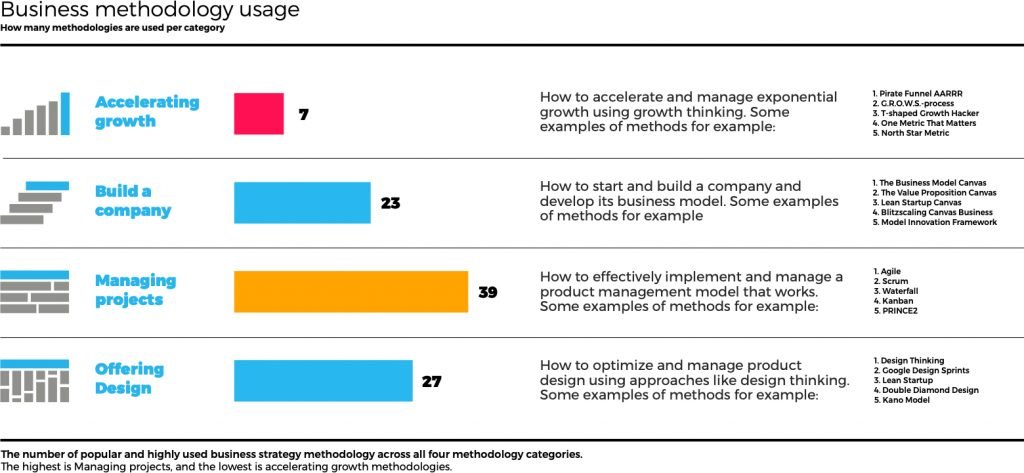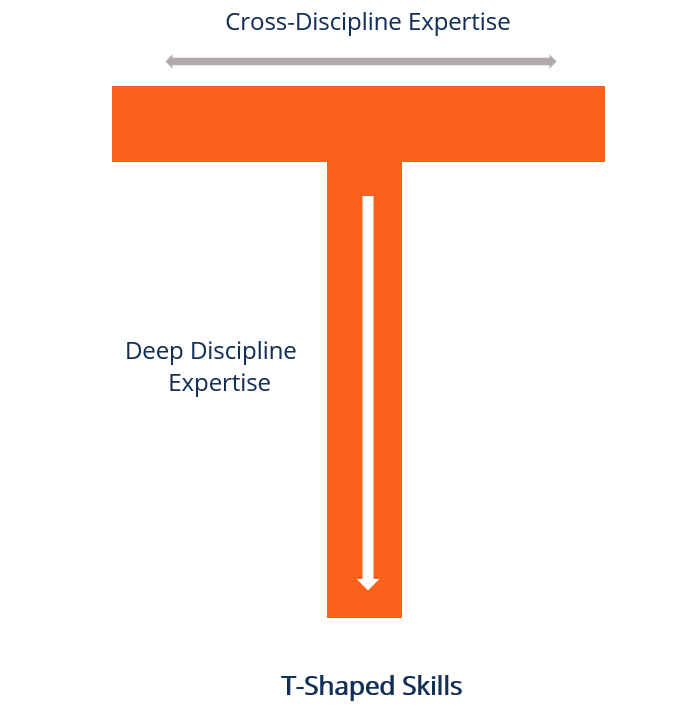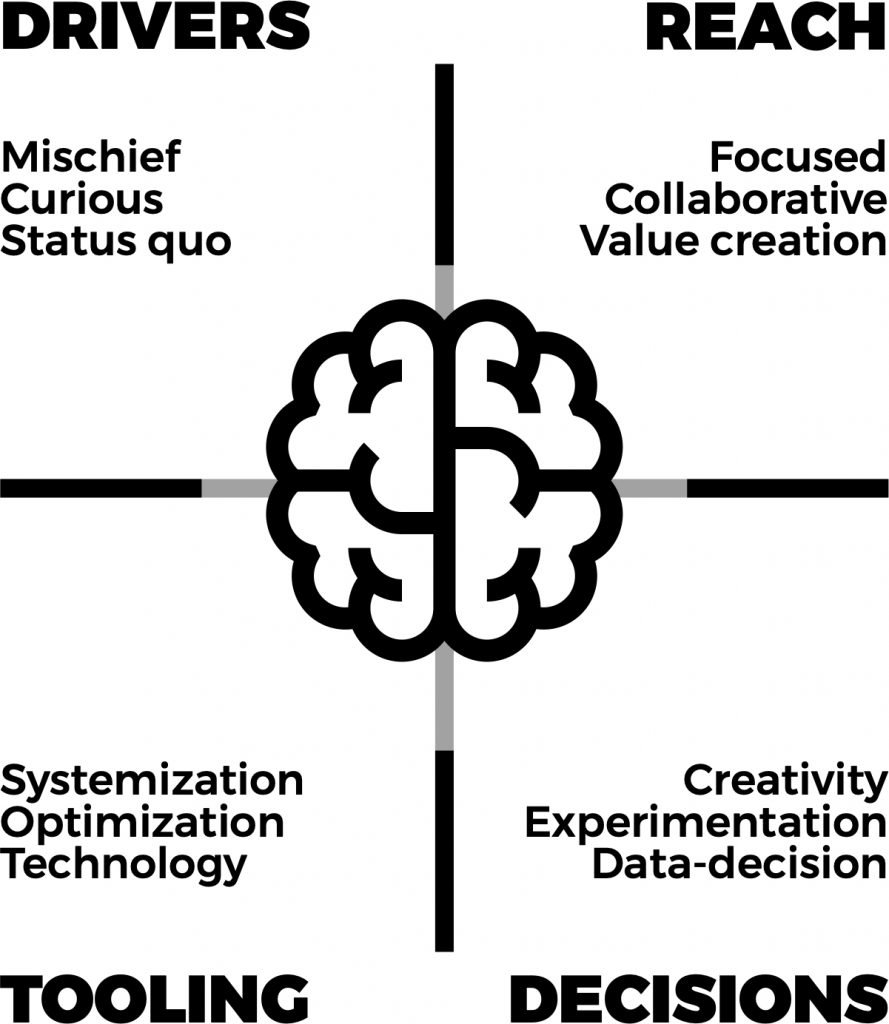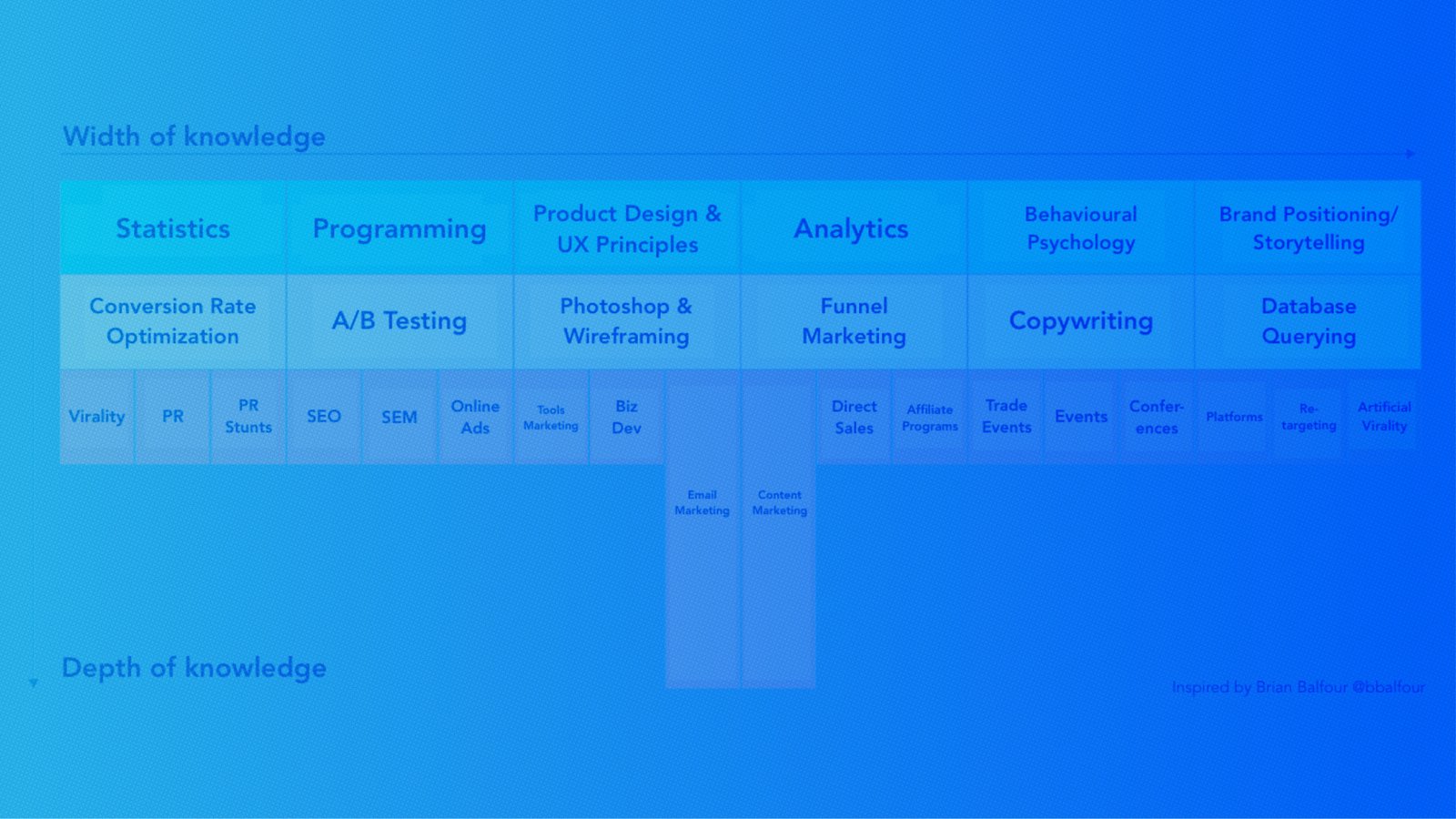Growth thinking vs. T-shaped skills / Marketer model
Growth thinking, like T-Shaped skills/model, is both design methodology for problem-solving. T-Shaped skills/model is for accelerating Growth, whereas growth thinking comes from the same family of business methodologies.
Both serve an equally important role as they complement each other in several ways. They compliment each other, where the T-Shaped skills/model is about skill-building for growth management, and growth thinking accelerates the organization’s Growth.
If you look at the spectrum of business methodologies, there are four types.

Accelerating Growth
How to accelerate and manage exponential Growth using growth thinking. Some examples of methods are:
- Pirate Funnel AARRR
- G.R.O.W.S.-process
- T-shaped Growth Hacker
- One Metric That Matters
- North Star Metric
Build a company
How to start a company from the beginning. Some examples of methods are:
- The Business Model Canvas
- The Value Proposition Canvas
- Lean Startup Canvas
- Blitzscaling Canvas Business
- Model Innovation Framework
Managing projects
How to effectively implement and manage a product management model that works. Some examples of methods are:
- Agile
- Scrum
- Waterfall
- Kanban
- PRINCE2
Offering Design
How to optimize and manage product design using approaches like design thinking. Some examples of methods are:
- Design Thinking
- Google Design Sprints
- Lean Startup
- Double Diamond Design
- Kano Model
Where do T-Shaped skills/model and Growth thinking connect
There are two perspectives; the first is if a new startup is beginning from scratch, and the second is if you are already operating a business regardless of size.
If you a startup — T-Shaped skills/model becomes your capability building engine to hire, measure performance, promote and develop talent. Growth thinking helps accelerate that talent tool to build an actional organization designed to scale and sustain long-term Growth.
If your an operating business — growth thinking would supersede T-Shaped skills/model as the strategy and the optimization of your Growth would set the rules, tone, and even the plans to the talent needed who would best suit the type of Growth you’re pursuing.
Will T-Shaped skills/model, improve design thinking.
In short, no, they work in total isolation from each other, but they complement one another when combined in the right sequence—knowing which method to us when is an essential part of a leader’s and founder’s strategy.
Selecting the right methodology is about the following aspects:
- Can it achieve what we need
- Is it easy to use and learn
- Is there enough supporting materials
- Can it improve our ROI
Those four factors help you choose the right method at the right time. Supporting materials and being able to learn the method are critical. The faster and easier you can adapt to a new method, the better it is. This factor would supersede inherent drawbacks, which they would all have.
It’s more important to learn quickly vs. inherited drawbacks because once you know the drawbacks, you can become even more creative with those methodologies. Many of the methodology designers focus on updates and upgrades over time.
The T-shaped skills / Marketer model explained.
Building T-shaped knowledge and competencies are one of the most valuable things you can do for your future career and personal development. T-shaped skills can be much more than just a bridge to IT; they can also be people who can bring significant value to your team and your organization. The high-level mix of broad skills is technology, marketing, strategy, and business operations. Technology plays the most vital part as it helps accelerate growth, and hence this becomes core to the cross-skilled approach.
T-shaped people possess cognitive skills, emotional intelligence, and creativity, making themselves the whole package. T-Shaped Skills integrate newly acquired knowledge with previous knowledge and gives your team the ability to understand various new information.
Agility is key to making T-Shaped teams work.
When you are building an agile team, you should look for agile teams made up of people with T-shaped skills. Teams that consist of T-Shape team members who possess and want to acquire these abilities tend to be more flexible and resilient, as their capabilities enable swarms to occur faster. By searching for T-Shaped skills, a T-Shape person helps you build your company’s best interdisciplinary teams. T-shaped people promote this attitude and make it practical, as these people can work on more than one type of task. A Good T-skilled attitude is:
- Someone who is flexible
- Someone who is creative
- Someone who is a team player
- Someone willing to consistently learn
- Someone willing to share knowledge and train
- Someone willing to collaborate with others
You need T-shaped skills, and you have to be aware that not many people in the market are good. They need a T-Shape person with the right combination of skills to shape their abilities.
Isolated skills don’t work.
You develop expertise and experience in a single area and never learn to apply those skills, including the complementary skills described by Brown and Gardner, to other areas. T-Shaped specialists who delve deeply into a particular field cannot use these skills in other areas. We need a new generation of T-shape people with the right combination of skills for the new market. This cross-skilled approach gets talent focused on multi-level and making them way more valuable.
Can T-Shaped Skills fit with Leadership Skills? If you do not have a program in place for this, it’s best to include T-shaped professionals in your leadership training. T-shaped professionals can contribute to your team in various ways, not only in their respective fields of expertise.
Developing T-shaped skills
Focusing on being a T-shaped person and acquiring expertise in an area makes it easier to maintain that expertise even after you have reached that skill level. There is a level at which you can take these skills a step further and place even more value on them. As more and more people come to know the T-shaped skills and their benefits, there will be a surge in the number of people interested in their respective fields.
Online training to develop T-shaped skills.
There are many platforms like Udemy, Skillshare, and LinkedIn where T-shaped skilled can be quickly acquired for a low-cost. The challenge will be practicing them to fine-tune capabilities. Some of the T-shaped talents start with freelancing to put their skills into play and make money quickly. More often than none, this type of talent finds the lifestyle and ability to make money as a freelancer to be much more attractive than working for a company. This is a big challenge for corporates and medium-sized businesses getting access to the best possible T-Shaped talent available.
T-shaped skills are the most sought after, but where do you find people with them, and how do they find out what they should specialize in? Did you know that they are an integral part of an essential competitive advantage?
T-shaped people function best in cross-functional situations where they can bridge the gaps between different functions. This ultimately leads to better problem-solving as they can:
- Have more visibility
- access to different functions
- bring in better resources
- optimize links that were not
- and get the results needed quick
What are the T-shaped skills?
The T-shaped approach is spread across sections of skills that are combined towards a specific skill set. The T-shaped process isn’t the only model but one of the most popular for growth hackers. This brings into play several aspects like:

LEVEL 1 – skills and capabilities
- Front-End Code
- Service Design
- UX Design
- Behavioral Psychology
- Stakeholder Management
- Augmented / Virtual Reality
- Finance
- Omnichannel Marketing
- Distributed Ledgers
LEVEL 2 – skills and capabilities
- Analytics
- Conversion Rate Optimisation
- Experiment Design
- Funnel Marketing
- Automation & APIs
- AI & Machine Learning
- Branding / Storytelling
- Copywriting
LEVEL 3 – skills and capabilities
- Paid Social
- Organic Social
- SEO/SEM
- Tools Marketing
- Marketplaces
- Sales
- Email Marketing
- Content Marketing
- PR / Influencer
- Qualitative Research
- Virality
- Retention
- Mobile Optimisation
- Landing Page Creation & Optimisation
- Lead Generation
- Revenue Testing
- User On-Boarding
- Lifecycle Marketing
These 35 skills over three levels are what help determine a good vs. a rising growth hacker. This helps growth hacking teams also manage diverse skills across the whole spectrum.
What is the Growth hacker mindset?
Four main taxonomies determine a growth hacker’s mind: drivers reach, decisions, and tools. The combination of the four forms the underlying idea of aching disproportionate results.

1. Drivers
The drivers are the underlying motivations and stimuli that inspire how growth hackers think and take action.
 Mischiefness
Mischiefness
They deeply need to break the rules, as they do not believe in the rules they have not benefited from governing and limiting their way of life. Therefore this underpins their thinking to find a way to break the rules to their benefit.
 Curiosity
Curiosity
They are fascinated by digging deeper into how things work by asking the big why questions. This allows them to understand theories and phenomena better to map out their mechanics to manipulate them toward their benefit.
 Status quo
Status quo
The general rules over institutionalization drive their need to challenge the establishments surrounding them. This allows them to break the rules and change the norms of how society around them works.
2. Reach
Growth hackers have a goal to reach as many people as possible without the general population knowing how they did it.
 Focused
Focused
They have a too focused approach by pinning done abstract problems and creating unique structures to solve them.
 Collaborative
Collaborative
They have a resourceful approach where they work with like-minded people and find other cross-functional people to reach their goals effectively.
 Value-creation
Value-creation
They focus on creating value with monetization, often trying to reach the masses to make a change.
3. Decisions
When hacking growth optimization is the goal to solve at a high-level, there is no one solution to a single problem but finding the fastest, easiest, and cheapest way.
 Creativity
Creativity
Growth hackers are resourceful; they find simple, fast, and digestible ways to solve problems. One of the challenges for growth hackers is thinking too technically.
 Experimentation
Experimentation
They run tests and lots of them to determine the most optimal approach to getting results using all possible avenues.
 Data-driven
Data-driven
They make decisions based on data, even if the data might potentially be blinding. Data helps determine the most optimal options.
4. Tools
Growth hackers are always seeking new tools, optimizing existing ones, and finding optimal ways of connecting them to get solutions.
 Systemization
Systemization
For a solution to work, it needs to be automated, and when automated, the probability of scalability is a lot higher when seeking exponential growth.
 Optimization
Optimization
When finding the right tools and connecting them, the goals are optimizing the way they work together. This holistic approach helps maximize optimization.
 Technology
Technology
Technology enables automation, scalability, and integration, which underpins growth even if you’re a non-tech company.
The mindset of a growth hacker is defined by how he or she solves problems. The elements described above are the most common thinking patterns of growth hackers.
Bringing it all together T-shaped skills and Growth Thinking
T-shaped talent plays a super important role in Growth, and when combined with the Growth thinking design methodology, it comes to a powerful combination. The way they are best used is when T-shaped skilled people use growth thinking for their Growth hacking designs, especially when collaborating, prototyping, and having to test quickly and at super low costs.
SOURCES
https://trydesignlab.com/blog/how-to-get-hired-understand-if-youre-an-i-t-or-x-s/
https://www.brainlabsdigital.com/blog/t-shaped-skills-digital-marketing/
https://collegeinfogeek.com/become-t-shaped-person/
https://www.objectivity.co.uk/blog/t-shaped-skills-business-analysis/
https://agileleanlife.com/t-shaped-skills-every-area-life/
https://rgalen.com/agile-training-news/2019/12/6/t-shaped-agile-leaders
https://railsware.com/blog/t-shaped-skills-in-product-development/
https://www.axelos.com/news/blogs/august-2020/what-employee-type-or-shape-are-you
https://www.tandfonline.com/doi/full/10.1080/23311975.2016.1153768
https://www.caseinterview.com/t-shaped-skills
https://adtmag.com/articles/2017/08/29/t-shaped-people.aspx
https://www.gettingsmart.com/2019/09/the-future-of-work-fits-some-employees-and-students-to-a-t/
https://corporatefinanceinstitute.com/resources/careers/soft-skills/t-shaped-skills/
To learn more about the author click here

 Mischiefness
Mischiefness